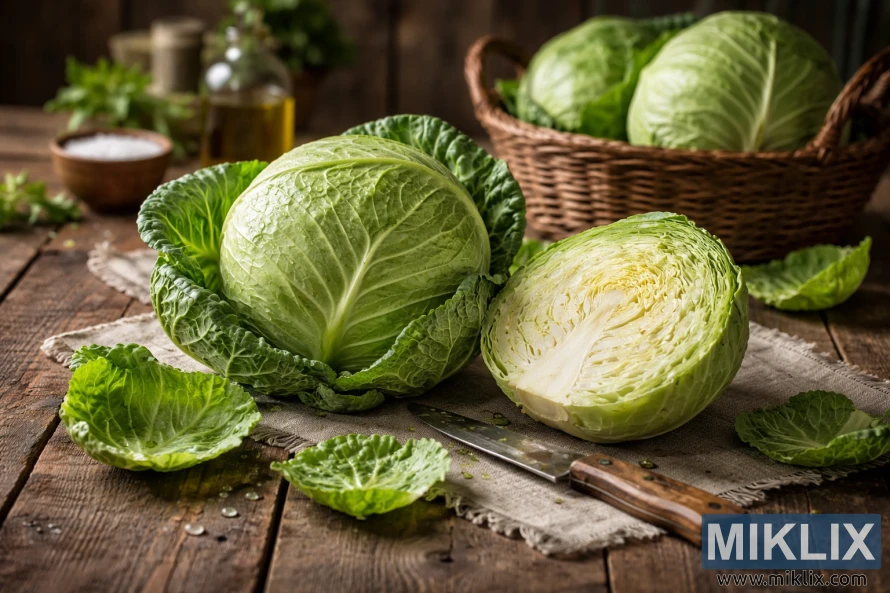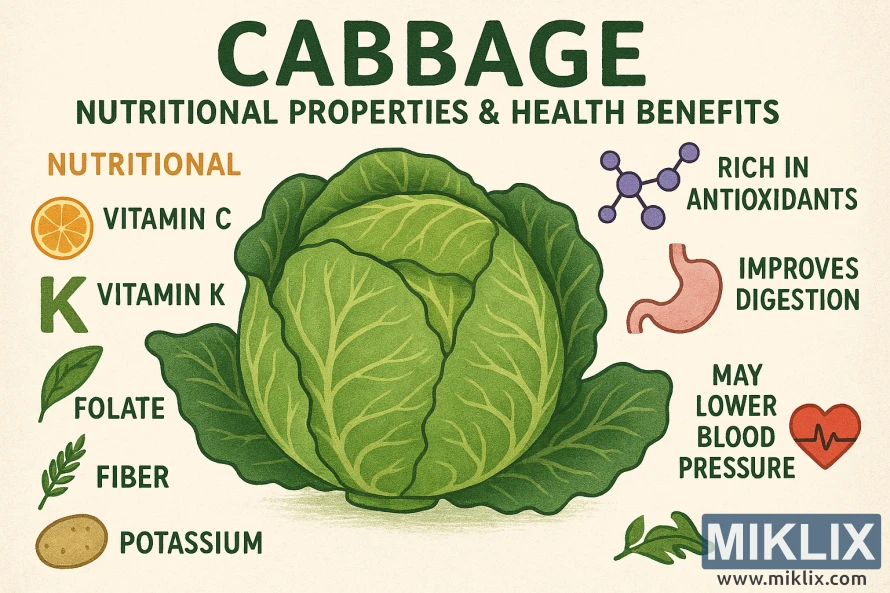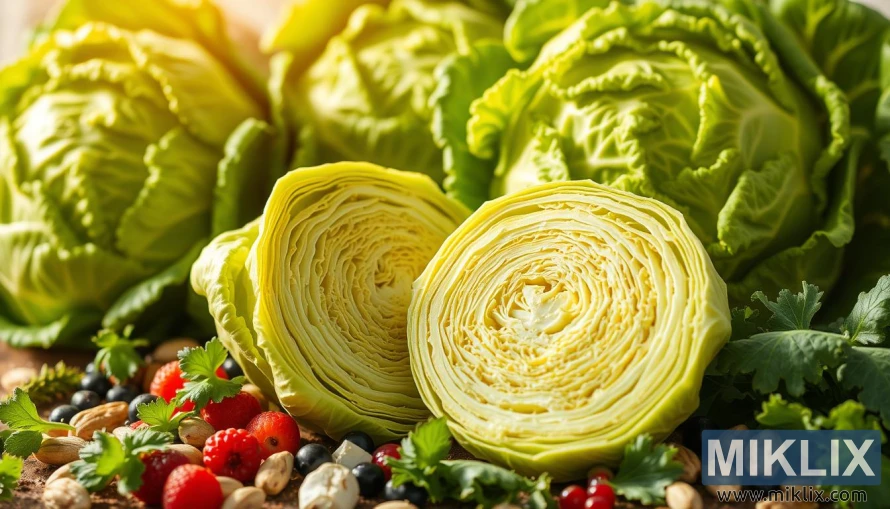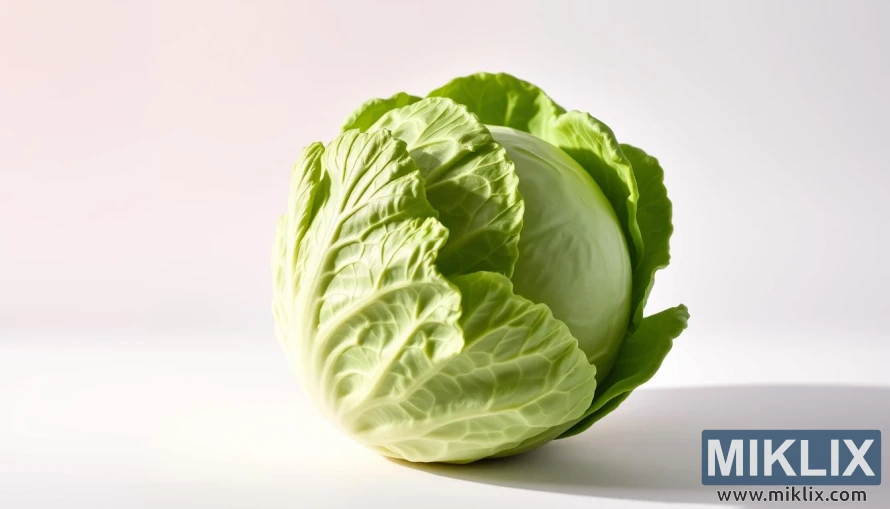The Power of the Leaf: Why Cabbage Deserves a Spot on Your Plate
Published: March 31, 2025 at 9:30:53 PM UTC
Last updated: January 4, 2026 at 8:33:34 PM UTC
Cabbage is often overlooked but is packed with nutrients. It's a key part of a healthy diet. This vegetable comes in green, purple, and red varieties, making it a true superfood. It's full of vitamins, minerals, and antioxidants. Eating cabbage can boost your health and support a balanced lifestyle.

Key Takeaways
- Cabbage is a nutrient-rich vegetable with numerous health benefits.
- It is considered a superfood due to its high vitamin and mineral content.
- Diverse varieties of cabbage provide extensive culinary options.
- Cabbage contributes to overall wellness with its antioxidant properties.
- Incorporating cabbage into your diet is easy and affordable.
What is Cabbage?
Cabbage is a dense, leafy vegetable from the cruciferous family. This family also includes broccoli, kale, radishes, and Brussels sprouts. It's grown all over the world and comes in colors like green, red, white, and purple. Each type of cabbage has its own taste and texture.
Cabbage has a long history, being grown for thousands of years. It's a key ingredient in many dishes, like kimchi and sauerkraut. The leaves of cabbage can be crinkled or smooth, making it a great addition to many meals.
Why Cabbage is Considered a Superfood
Cabbage is called a superfood because it's low in calories but packed with nutrients. It's rich in vitamins and minerals like vitamin C and K. These are key for keeping our bodies healthy.
Cabbage is full of antioxidants that fight oxidative stress. This stress can harm our bodies. Eating cabbage boosts our immune system and lowers disease risk.
It's also great for weight management. Adding cabbage to your diet can help you eat better. Plus, it's affordable and delicious, making it a great choice for meals.
Nutritional Profile of Cabbage
Cabbage is a low-calorie veggie, with only 22 calories per cup (89 grams). It's packed with vitamins and minerals, making it great for a healthy diet. It's a top source of vitamin K, giving you 56% of the Daily Value (DV).
It also has 36% of the daily value for vitamin C. Vitamin C boosts your immune system and keeps your skin healthy. Cabbage also has folate, manganese, and potassium, which are important for energy, muscle function, and bone health.

Cabbage is Packed with Nutrients
Cabbage is a top choice for those looking for healthy foods. It's full of antioxidants and polyphenols, which boost its health benefits. Vitamin C in cabbage is a big deal because it fights off serious diseases like cancer and heart issues.
The fiber in cabbage helps your digestion stay on track. It keeps your gut healthy and your digestive system working right. Plus, cabbage has trace minerals that are important for your body's functions. Adding cabbage to your meals can really help your health.
Benefits of Cabbage for Digestion
Cabbage is great for your digestive health. It has fiber that helps your body digest food well. Soluble and insoluble fibers make your stool bulkier, helping you go to the bathroom regularly.
The fiber in cabbage also keeps good bacteria in your gut healthy. This helps your body absorb nutrients better and boosts your immune system. Eating cabbage often can really help your digestion, making it a good choice for a healthy diet.

Anti-Inflammatory Properties of Cabbage
Cabbage is packed with health benefits, thanks to its strong anti-inflammatory properties. It's full of sulforaphane and kaempferol, which help fight inflammation. Studies show these compounds can reduce chronic inflammation, linked to heart disease and rheumatoid arthritis.
Eating more cabbage and other cruciferous veggies can lower body inflammation. This makes cabbage a key part of a healthy diet. Adding cabbage to your meals can help manage inflammation and improve overall health.
Cabbage and Heart Health
Cabbage is more than just a versatile vegetable. It plays a big role in keeping your heart healthy. The red cabbage is packed with anthocyanins, which are antioxidants. These can help lower blood pressure and improve cholesterol levels.
Adding cabbage to your meals can be a smart move for your heart. It's full of nutrients that help protect your heart and reduce inflammation. This supports your heart health in many ways.
Cabbage and Cholesterol Management
Cabbage is key in managing cholesterol, thanks to its soluble fiber. This fiber grabs cholesterol in the gut, stopping it from getting into the blood. This action is critical for keeping LDL cholesterol levels healthy, which is good for the heart.
Cabbage also has phytosterols, plant compounds that block cholesterol absorption in the gut. Adding cabbage to your meals can greatly improve LDL cholesterol levels. It's a great choice for those looking to boost heart health.
But cabbage's benefits don't stop at cholesterol. It supports a balanced diet, improving overall health. You can enjoy it raw in salads or cooked in many dishes. It's easy to add to your daily meals.

Cabbage's Role in Cancer Prevention
Cabbage is more than just a salad ingredient. It has a key role in fighting cancer. This veggie is packed with antioxidants that fight off harmful free radicals. Glucosinolates in cabbage are also important. They turn into substances that help fight cancer when we eat them.
Eating cabbage often can help lower cancer risk. Studies show that eating more cruciferous veggies like cabbage is good. The antioxidants and glucosinolates in cabbage work together to protect against cancer.
Easy Ways to Incorporate Cabbage into Your Diet
Cabbage is a versatile ingredient that can make any meal better. It's easy to add cabbage to your diet because of its many preparation methods. Here are some simple and tasty ways to enjoy this healthy veggie:
- Add shredded cabbage to salads for a satisfying crunch.
- Stir-fry cabbage with your favorite vegetables for a quick side dish.
- Include cabbage in soups or stews to enhance flavor and nutrition.
- Create coleslaw as a tasty topping for sandwiches or BBQ dishes.
- Ferment cabbage to make kimchi or sauerkraut, both of which are rich in probiotics.
These cabbage recipes not only add flavor but also improve your health. Whether you like it raw or cooked, there are endless options. Try mixing different spices and ingredients to find your favorite!
Cabbage as an Affordable Healthy Food Option
Cabbage is a top pick for those looking for affordable healthy foods. It costs about 62 cents per pound. This makes it a great choice for those who want to eat well without spending a lot.
This vegetable is packed with nutrients like vitamin C, fiber, and antioxidants. Adding cabbage to your meals can improve your health and help you eat better.
- Rich in vitamins and minerals
- High in dietary fiber
- Supports healthy digestion
- Offers anti-inflammatory benefits
Choosing cabbage can help you eat better without spending a lot. It's a key item for anyone watching their budget. It's good for your health and your wallet.

Conclusion
Cabbage is a superfood that's packed with vitamins and fiber. It's full of vitamin C and vitamin K. Eating cabbage regularly can boost digestion and heart health.
It's also great for reducing cancer risk. This veggie is easy to add to your meals. You can eat it raw, cooked, or even fermented.
Its long shelf life makes it a great choice for everyone. It's a key part of a healthy diet. By adding cabbage to your meals, you can enjoy tasty flavors and health benefits.
Choosing cabbage can lead to a healthier lifestyle. It's a nutrient-rich food that's easy to include in your diet. So, let's make cabbage a part of our meals for better health and energy.
Further Reading
If you enjoyed this post, you may also like these suggestions:
- Eating Green: How Asparagus Fuels a Healthier Life
- Brain Fuel in a Capsule: How Acetyl L-Carnitine Supercharges Energy and Focus
- Tropical Treasure: Unlocking the Healing Powers of Coconuts
